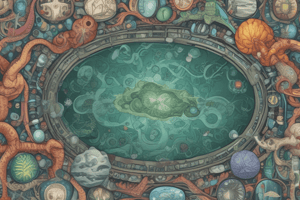Podcast
Questions and Answers
What is biology?
What is biology?
The study of life.
Which of the following are major divisions of Biological Sciences? (Select all that apply)
Which of the following are major divisions of Biological Sciences? (Select all that apply)
- Zoology (correct)
- Microbiology (correct)
- Physics
- Botany (correct)
The word 'biology' is derived from the Greek words 'bios' (meaning life) and '_______' (meaning study).
The word 'biology' is derived from the Greek words 'bios' (meaning life) and '_______' (meaning study).
logos
The Human Genome Project was completed in the 19th century.
The Human Genome Project was completed in the 19th century.
Which technique is known for Gene Editing?
Which technique is known for Gene Editing?
What is the significance of the Miller-Urey experiment?
What is the significance of the Miller-Urey experiment?
What theory suggests that living organisms came spontaneously from nonliving matter?
What theory suggests that living organisms came spontaneously from nonliving matter?
What did Francesco Redi's experiment demonstrate?
What did Francesco Redi's experiment demonstrate?
Louis Pasteur's experiments confirmed spontaneous generation.
Louis Pasteur's experiments confirmed spontaneous generation.
The study of the entire genetic material of an organism is called _______.
The study of the entire genetic material of an organism is called _______.
Flashcards are hidden until you start studying
Study Notes
Overview of Biology
- Biology is the study of life, derived from Greek "bios" (life) and "logos" (study).
- Biologists examine the structure, function, growth, origin, evolution, and distribution of living organisms.
Major Breakthroughs in Biology
- Human Genome Project completed in the 21st century, mapping the entire human genome.
- Genetic recombination techniques enable the rearrangement of genetic material.
- E.coli transformation involves altering the genetics of E.coli bacteria for various applications.
- CRISPR-Cas9 technology allows precise editing of DNA sequences.
- Dolly the sheep became the first cloned adult mammal, marking a milestone in cloning research.
Divisions of Biological Sciences
- Three major branches:
- Zoology: Study of animals
- Botany: Study of plants
- Microbiology: Study of microorganisms
Traditional Branches of Biological Sciences
- Taxonomy: Classification and naming of organisms.
- Cytology: Study of cell structure and function.
- Genetics: Exploration of heredity and variation.
- Ecology: Interactions between organisms and their environment.
- Physiology: Functions of living organisms and their anatomical systems.
- Embryology: Development from fertilization to birth.
- Morphology: Form and structure of organisms.
- Evolution: Study of the origin and differentiation of species.
- Biochemistry: Chemical processes within living organisms.
- Immunology: Study of the immune system.
New Subdisciplines in Biology
- Molecular Biology: Focus on molecular mechanisms within cells.
- Genomics: Analysis of an organism's complete genetic material.
- Proteomics: Examination of the protein content in living organisms.
- Bioinformatics: Use of software and algorithms to analyze biological data.
- Pharmacogenomics: Impact of genetics on individual responses to drugs.
Theories on the Origin of Life
- Life originated over 3.8 billion years ago.
- Miller-Urey experiment demonstrated organic molecules could form from inorganic components.
- Creationism posits life was created by a divine being.
- Cosmozoic (Panspermia) Theory suggests life originated from extraterrestrial sources.
- Abiogenesis (Spontaneous Generation) proposes life can arise from nonliving matter.
- Biogenesis states life originates from existing living organisms.
Key Experiments on Spontaneous Generation
- Francesco Redi: Demonstrated that maggots do not arise from covered jars of meat, questioning abiogenesis.
- John Needham: Claimed that sealed broth had life, but his findings were contested.
- Abbe Lazzaro Spallanzani: Showed that sealed, boiled broth does not grow organisms, supporting the need for air.
- Louis Pasteur: Used "swan-neck" flasks in 1861 to argue against spontaneous generation, proving that microorganisms arise from existing life rather than spontaneously from nonlife.
Studying That Suits You
Use AI to generate personalized quizzes and flashcards to suit your learning preferences.




